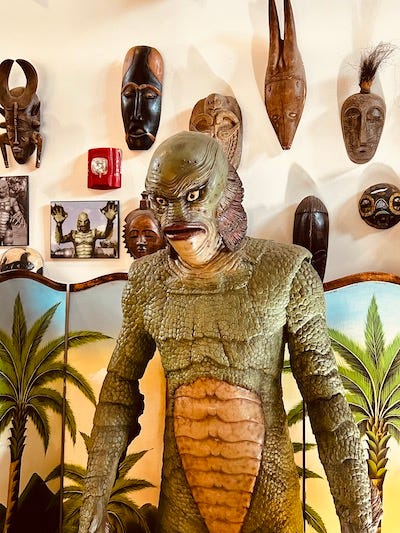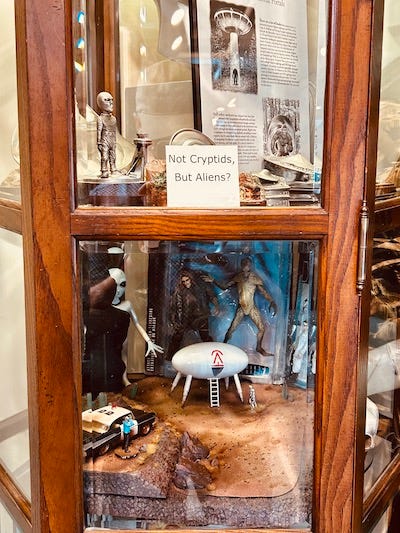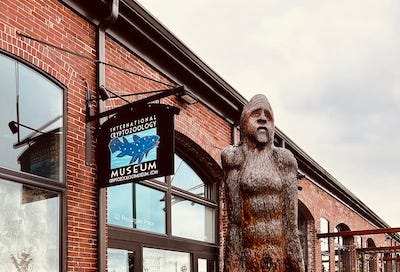A few weekends ago I went with my wife and two dear friends to Portland, Maine, for a bit of rest and relaxation. We visited the lighthouse, walked by the waterfront, checked out the art museum, and ate and drunk more than usual in some of the fine local establishments.
Also, we went to the International Cryptozoology Museum. Given my interest in pseudoscience, I just couldn’t resist, and my friends happily went along for the ride.
Cryptozoology is not the sort of discipline that gets taught in college biology classes. It is the study, such as it is, of unknown, legendary, or extinct animals whose current existence is disputed and/or unsubstantiated. Think Loch Ness monster, Yeti, and such.
Although it is considered pseudoscience, the field was established by two people with legitimate science degrees, back in the 1950s: Bernard Heuvelmans (PhD, Free University of Brussels) and Ivan T. Sanderson (MAs in botany and ethnology, Cambridge University).
Sanderson conducted expeditions in tropical areas in the 1920s and ‘30s, collecting animal specimens and writing about nature travel. In the late ‘40s and early ’50 he became a minor tv celebrity doing shows on animals, and made enough money to purchase a property in New Jersey that he turned into a roadside attraction called “Ivan Sanderson’s Jungle Zoo.” It was eventually flooded by the Delaware River as a result of Hurricane Diane in 1955.
Sanderson began his career in pseudoscience as an early follower of Charles Fort (1920-1932), himself a pioneer in the study of “anomalous phenomena.” Sanderson went on to publish a Fort-inspired book of his own, entitled Abominable Snowmen. William Straus reviewed the book in Science magazine (issue 3512, 1962) and wrote:
“Unfortunately, the author’s concept of what constitutes scientific evidence will scarcely be accepted by most scientists. His standards are unbelievably low.”
Straus had a point. For example, Sanderson studied some giant three-toed footprints left at Clearwater Beach, Florida, and declared them to be from a 15-foot tall penguin. He added that, in his opinion, the footprints were impossible to fake. But one Tony Signorini admitted to have faked the prints using a pair of cast iron feet attached to high-top sneakers. Oh well.
Sanderson’s last contribution to pseudoscience was the concept of “vile vortices,” such as those allegedly found at the Bermuda Triangle and the Devil’s Sea (in the Pacific region south of Tokyo). These “anomalic regions” are apparently responsible for UFO sightings and poltergeist activity.
Heuvelmans, meanwhile, had began his career doing actual scientific work. His doctoral dissertation was on the teeth of the aardvark, a nocturnal mammal native to Africa. He lived an unusual life, first escaping a Nazi camp during WWII and then making a living as a jazz singer in Paris.
Heuvelmans was influenced by the books of Jules Verne and Sir Arthur Conan Doyle, particularly The Lost World. Heuvelmans wrote a book on sea serpents and giant squids. Aaron Bauer, a biologist, commented that Heuvelmans’s books “often eschew critical analysis of available data.”

Back to the Museum. It’s a small place densely packed with, well, it’s hard to explain, exactly. There are, of course, no actual artifacts. You will not find there a tooth from Nessie, or hair belonging to the Abominable Snowman. Rather, what you see is an odd mix of imaginary monsters, real animals like elephants and the Coelacanth (a rare fish found off the east coast of Africa and in Indonesia), and actual fossil species (from mastodons to dinosaurs). The point, I guess, is for the imaginary entries to gain legitimacy by simple visual association with the real ones, whether extant or extinct.
The Museum was founded in 2003 by Loren Coleman, who has written forty books on various pseudoscientific matters (though, of course, that’s not how he refers to them). Coleman did study anthropology and zoology, and did doctoral-level work in anthropology at Brandeis University. He apparently even taught at a number of New England universities between 1980 and 2004.
One of Coleman’s contributions to cryptozoology was the “explanation” he gave of a 1955 incident in which an Indiana woman was pulled underwater in a lake by something she was unable to see. Coleman attributed the near drowning to a “merbeing,” a creature that is half human and half fish. Skeptic Justin Mullis commented:
“Coleman has clearly used a scene from the film [The Creature from the Black Lagoon] to prematurely solve an unexplained event, ignoring more plausible explanations, such as the possibility that Mrs. Johnson was attacked by a large fish or turtle or caught her leg on a submerged log. He also ignores the fact that Johnson’s story appeared at the same time the Black Lagoon trilogy of films was being released in theaters.” (The Paranormal and Popular Culture: A Postmodern Religious Landscape, ed. by Caterine Darryl and John W. Morehead, 2019).

This was a fun way to spend a couple of hours in Portland, Maine. But the real question is: why do so many people believe this stuff? That is, what is the psychology underlying beliefs in weird things?
That’s a complicated question, about which there is an increasing amount of research available, and whole books have been written about it. At the beginning of our visit we were greeted by a middle aged man who worked at the Museum and who was an emphatic believer. When he found out that three of us were scientists he began what can only be characterized as a jovial rant (but a rant nevertheless) about how one cannot trust official science. Folklorist Peter Dendle had this to say about what may motivate some of these people:
“The psychological significance of cryptozoology in the modern world ... serves to channel guilt over the decimation of species and destruction of the natural habitat; to recapture a sense of mysticism and danger in a world now perceived as fully charted and over-explored; and to articulate resentment of and defiance against a scientific community perceived as monopolizing the pool of culturally acceptable beliefs.” (Cryptozoology in the Medieval and Modern Worlds, Folklore, 2006)
I’m not so sure about guilt over the destruction of nature, since very few people seem to suffer from such a condition, and I haven’t really seen any evidence of it among the many purveyors of pseudoscience I have encountered throughout my life. But Dendle seems to be right on target as far as the rest is concerned.
I myself was attracted by pseudosciences such as ufology and parapsychology when I was a kid, and I remember that a big part of such attraction was precisely the sense that science had pretty much discovered everything there is to discover (ah!), and I liked to fantasize about a world full of mysteries, mysteries that I may be able to contribute to solve, even though I had no qualifications and no technical knowledge of anything. It took studying real science for a few years in high school to cure me of that particular condition and make me appreciate two things: first, the real world is still very much mysterious, no need to invent new mysteries! Second, it takes hard work to unravel even minor puzzles concerning nature. But many people want the success without having to sweat about it, witness the rise of no-nothing “influencers” on the internet.
Dendle is also very much correct about widespread mistrust of science among people who embrace pseudoscience. Ufologists, parapsychologists, cryptozoologists and so forth very much want to ape some of the trappings of science, including the organization of conferences and the publication of journals. But they reject the notions of peer review and of technical expertise. They also distrust anyone with “PhD” after their name, unless that person happens to be sympathetic to their cause.
One example being Dr. J. Allen Hynek (1910-1986), an astronomer who was involved in the famous Project Blue Book, a US Government-sponsored program to look into claims of UFO sightings that went on—without substantial findings—from 1952 to 1969.
I met Hynek a few years before he died, and he came across to me as a thoughtful, intelligent man. For many years I’ve been wondering why he decided to take the pseudoscientific turn, and then it struck me: his career in astronomy wasn’t really going anywhere, and his position as a legitimate scientist quickly made him a rock star in the small ufology universe. He even appeared, briefly, in Steven Spielberg’s Close Encounters of the Third Kind, for which he “consulted” as an expert. In fact, it turns out he was good at that sort of things: later on he oversaw the design of the camouflage effects for the movie Predator, and eventually even won the Oscar for Best Visual Effects for his work on What Dreams May Come.

But why does a substantial minority of the general population go for astrology over astronomy, or parapsychology over psychology, or cryptozoology over zoology? Paleontologist George Gaylord Simpson wrote:
“Humans are the most inventive, deceptive, and gullible of all animals. Only those characteristics can explain the belief of some humans in creationism, in the arrival of UFOs with extraterrestrial beings, or in some aspects of cryptozoology. [...] In several respects the discussion and practice of cryptozoology sometimes, although not invariably, has demonstrated both deception and gullibility. An example seems to merit the old Latin saying ‘I believe because it is incredible,’ although Tertullian, its author, applied it in a way more applicable to the present day creationists.” (Mammals and Cryptozoology, Proceedings of the American Philosophical Society, 1984)
And speaking of creationists: there is, interestingly, a subset of cryptozoologists who are young earth creationists, that is they believe that the Earth is only a few thousand years old, just as it says in the Bible. It makes sense: if you deny that the dinosaurs roamed the earth for millions of years and went extinct at the end of the Cretaceous, perhaps your worldview will suffer less cognitive dissonance if you believe that they are alive and well in the modern world.
The next obvious question is: what can we do to contrast widespread belief in pseudoscience and distrust in science, a combination that can turn lethal when people start rejecting vaccines and declaring that climate change is a hoax perpetrated by “Big Science”?
Traditional skeptics, meaning the kind of people (like yours truly) who write for magazines like Skeptical Inquirer, have engaged in what is often pejoratively referred to as “debunking,” that is in the systematic investigation of extraordinary claims to show that, invariably, they result from perfectly ordinary phenomena (or from fraud).
This sort of activity is important, because “skeptic” means inquirer, and we cannot and should not simply dismiss allegedly pseudoscientific claims out of hand. We need to do the hard work first, the very same hard work that is typically avoided by those who make such claims.
But investigating and exposing isn’t enough. There are at least four additional areas to work on. Two of these were pointed out by Aristotle in his Rhetoric. He wrote that when we want to persuade people of course we need first and foremost to get our arguments and facts straight (logos), which is what classical skeptics and scientists strive to do. But we also need to establish our credentials with the audience (ethos), and such credentials can’t just be “hey, I’m a university professor, so shut up! Lastly, we need to connect with others at an emotional level (pathos), to persuade them that they should care about the truth of what is being debated.
The other two areas of action have already been mentioned, one explicitly and one implicitly. The issue of trust in science and academia is a big one. All of us simply don’t have the time or expertise to truly dig into anything and everything. We have to trust experts on a huge variety of topics. If your teeth ache, you go to the dentist; if your car breaks down, you go to the mechanic; if you are planning for retirement you go to an accountant; and so on. This is necessary and commonsensical. And yet certain institutions—including scientific ones—are experiencing a crisis of trust.
The causes of this crisis are complex, and do include some culpability for scientists and science communicators, who too often speak with certainty about things for which there can be no certainty, or treat their interlocutors with contempt while they should be listening.
Which brings me to the last area of intervention: science literacy or, to be precise, lack thereof. We hear a lot of talk (though that’s what most of it is: talk) about “critical thinking,” and I’m all in favor of it. Heck, I occasionally teach courses on the subject at City College (here is one of my favorite textbooks). But in the case of pseudoscience what we need is science literacy. The problem is that science literacy is not at all the same as have people watch nature documentaries, or even getting them to take a college level intro course in physics or biology. Indeed, the latter will likely be so boring as to kill any interest most students may have in science and leave a bad taste about the subject for the rest of their lives.
Science literacy really means understanding how science works as a process, pitfalls included. Ideally, it has relatively low factual content drawn from specific sciences and a heavy dose of history, philosophy, and sociology of science. We need people to understand that science is a human activity, which changes over time and is characterized by power structures. But we also need them to appreciate that there simply is no “alternative way of knowing.” Just like when your car breaks down you go to your mechanic, when it comes to understanding the natural world the only game in town is science. And when it comes to manipulating that world for our benefit, the only option is science’s daughter, technology.
That is why places like the Cryptozoology Museum, as amusing and entertaining as they may be, are ultimately sad. They are a monument to what Simpson would characterize as boundless human gullibility. It was particularly painful to see parents bringing children to the Museum, thus exposing them to something that is far from harmless and that could affect the way they see science, reason, and evidence for the rest of their lives. As astronomer Carl Sagan aptly put it:
“We live in a society absolutely dependent on science and technology and yet have cleverly arranged things so that almost no one understands science and technology. That’s a clear prescription for disaster.” (Bringing science down to earth, Hemispheres, 1994)





A huge problem, which you mentioned, is how “the science” has been communicated in popular media. It is communicated in absolutes. So when our understanding evolves/changes, people view that the previous reports were wrong, so the “science” was wrong. “Can’t these damned scientists make up their minds!?” No good scientist should act and speak in absolutes. Media needs to learn to say “the best available evidence...” Great article!
"science literacy is not at all the same as have people watch nature documentaries, or even getting them to take a college level intro course in physics or biology. ... Science literacy really means understanding how science works as a process, pitfalls included."
One of my all-time favourite books on this subject (I have never seen the accompanying TV series) is Philip Morrison's "The Ring of Truth: An Inquiry into How We Know What We Know"
https://en.wikipedia.org/wiki/Philip_Morrison
He takes readers into the process of the kinds of questions that sciences tackle and how they arrive at answers, such as in the first chapter: an analysis of the calorie expenditures for a bicyclist during the Tour de France. They can eat as much as 6,000 calroies a day. Where does it all go? On the way, he has a discussion of thermodynics: I love the way he measures the calorie counts by converting them into a standard unit - jelly donuts - and bar-be-queing them to determine their energy.